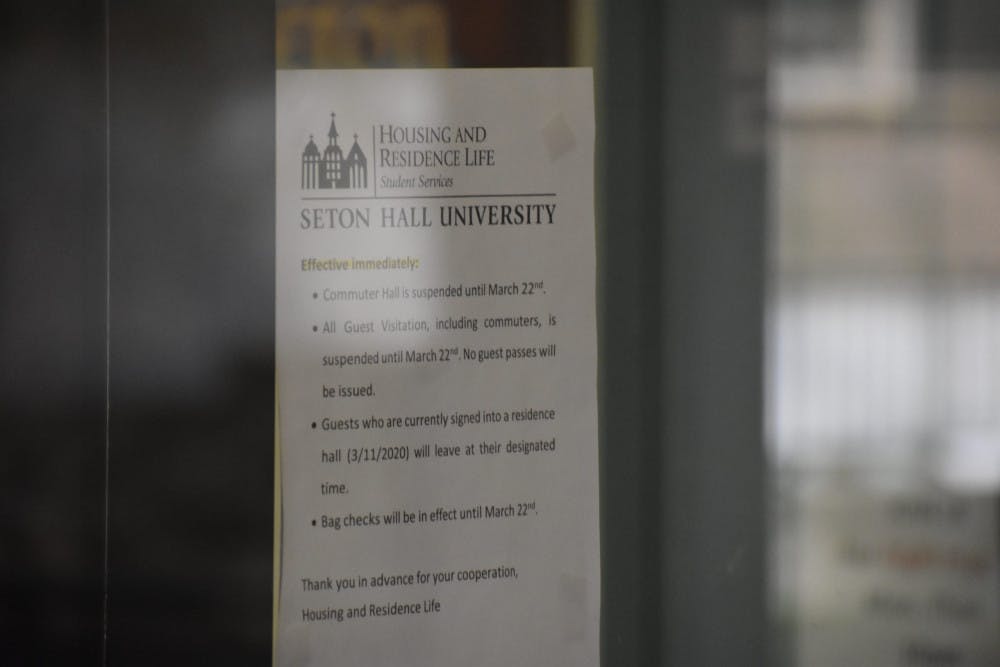
After revising its housing advisements two separate times, Seton Hall announced late Wednesday night that all resident students remaining on campus would be made to leave effective March 21 at 5:00 p.m. unless they received express permission in an email from the Department of Student Services to remain. This action taken by the University is a response to the spreading coronavirus (COVID-19) across the United States.
As late as March 14, the University had been actively advising students via email that they had the “the option to return to their homes if desired” until in-person classes resumed, and advised them to fill out a Housing Accommodation Form so the University could “provide adequate resources for you during this time” according to an email from the Office of the President.
That guidance suddenly changed on March 15, when an email from the Health Intervention and Communication Team announced that the Department of Housing and Residence Life would be encouraging students to return home if “they are at all able,” and promised to accommodate students who were suffering from extreme circumstances. In a tweet from Seton Hall’s official Twitter account, the University contested that Seton Hall was “not asking students to vacate” their dorms.
https://twitter.com/SetonHall/status/1239370226292187136?s=20
Just three days later, Seton Hall then backtracked that guidance in a late-night email on March 18, saying that they were ordering all resident students to leave their dorms by March 21 unless otherwise instructed, leaving many confused and scrambling to find a way home within the next three days.
One such student, Will Moll, a sophomore mathematics major, said that his request to stay on campus was denied despite the fact that he is from Northern California and his parents are displaced.
“I had written in my [housing accommodation form] that I would like to stay on campus because my parents are displaced and there is nowhere for me to stay,” Moll said in an interview with The Setonian. “Not to mention that Northern California is right in the middle of some of the worst of the outbreaks [of coronavirus].”
Moll said that one of his friends, an international student from Nigeria, did receive permission to continue living in University housing. But even his extension, documented in an email, specified that this was only temporary and not for the remainder of the semester.
Initially, Moll appealed to the Department of Housing and Residence Life for an extension, but “after I saw what they told my friend from overseas, I decided I didn’t want to have to go through this process again in a week or two,” he said, “so I asked for an extra day to sort things out and I booked a flight to San Antonio.”
Moll will now be staying with his grandparents indefinitely despite the fact that he may be an asymptomatic carrier of COVID-19, possibly putting them at risk.
“I’m inclined to give them the benefit of the doubt what with this situation being hectic and new, but we had precedent being set by neighboring Ivy League schools,” Moll said, citing the actions of schools like Harvard and Princeton which asked students not to return to campus weeks ago. “This whole situation could have been set in motion much quicker. If I’d had from spring break until now to set something up, that would have been much more ideal. Instead, my mom and I were making plans in a day.”
“I mean, it’s pretty absurd that it came to this at all,” he said.
Moll was not the only out-of-state student who struggled with the announcement.
Senior journalism major Payton Seda, whose home is in Southern California, said that she was surprised to hear she was being removed from the dorms.
“I was under the impression that I could stay because they said that I just had to fill out a form and let them know that I had extenuating circumstances,” she said. “But then they sent the new email on Wednesday that I needed special permission to stay. I hadn't heard anything at that point, but they said that we would know if we had permission by noon the next day.”
For the next 12 hours until noon on Thursday, Seda, who has been working remotely for her internship based on the East Coast, waited to hear back from the University to see if she would need to make arrangements to leave until ultimately being told the University would not accommodate her.
“I'm from California,” she said. “It's a six-hour flight away. I'm here all alone. I don't have really anyone to stay with here.”
Like Moll, Seda also appealed to the Department of Housing and Residence Life, not for permanent housing but for an extension so she could begin making arrangements home, which was granted.
“I wish they would've given us more notice that we would have to move out of the dorms because I could have better prepared for that,” Seda said, noting that the sudden notice from the University exacerbated her stress. “The way they acted was like it was no problem if we stayed. My parents even called them, and they said it was no problem and that they weren't kicking anyone out. And that was only a couple of days before they told me that no, I actually had to move out.”
Seda said she understands why the University is taking the measures that they’re taking, but that it is “a little too late” and referencing the female Seton Hall employee who had tested positive for COVID-19
Said Seda, “The chances of that person having had COVID-19 before even presenting enough symptoms to go get tested, they had likely already been exposed to several people.”
Nicholas Kerr can be reached at nicholas.kerr@student.shu.edu. Find him on Twitter @nickkerr99.





